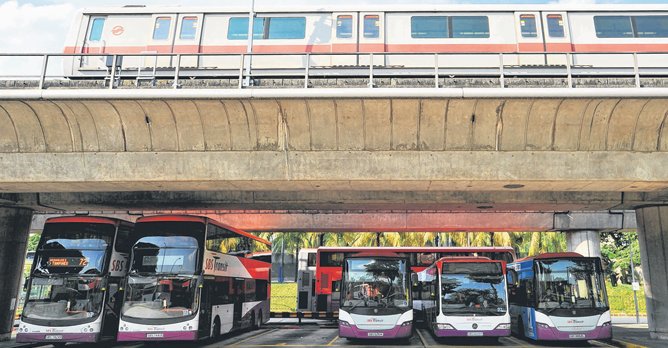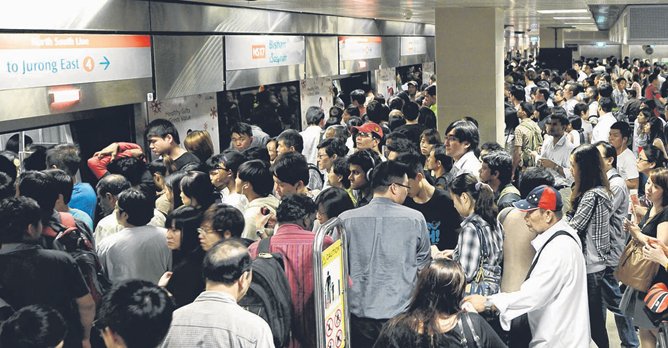Fares could go up by 7% as Public Transport Council begins review
03 Sep 2019|3,145 views
Bus and train fares could go up by up to 7% next year - or up to 10 cents - as the Public Transport Council (PTC) begins its annual fare review exercise.
This is the maximum increase that can be allowed under the current fare formula, which came into place last year and will be in place until 2022. If approved, this would be the highest fare increase in recent years.
Public transport operators must submit their fare applications - which should not exceed the maximum quantum that can be allowed - to the PTC by 23 September, the council said in a statement on 3 September. The PTC said that the largest contributing factor to the potential fare hike was the double digit increase in energy prices, which rebounded 26.2% in 2017, and 32.3% in 2018.
Other components making up the formula - such as the wage index, which measures the change in average wage over the preceding year, and the core consumer price index, which measures the change in inflation rate over the previous year - have also increased over the past year, the council noted.
The PTC noted Singapore's public transport had improved significantly over the past five years, with the introduction of more than 1,000 buses and 200 trains. Rail reliability has also seen improvements over this period, with the MRT network hitting one million kilometres between delays, a sevenfold improvement from 2015.
While these improvements have come with an increase in the cost of operations for public transport, the council noted that average fares are now four to seven cents lower than they were in 2015.
A dip in energy prices between 2015 and 2017 saw a combined 8.3% reduction in fares during that time, though last year saw a 4.3% increase in fares. "Over the last five years, the gap between costs and fares has been widening. This gap has, thus far, been funded by the Government together with the rail operators," said the PTC.
The authorities will spend about $4.5 billion on the upgrading of Singapore's rail assets, and is expected to subsidise public bus services to the tune of $5 billion.
In July, Transport Minister Khaw Boon Wan said the Government is currently subsidising more than 30% of public transport operations, and that higher fares are necessary to keep these subsidies in check. The PTC said in considering the fare adjustments, it would "consider the views of commuters and relevant stakeholders, and will continue to strike a fair balance between fare affordability and the financial sustainability of the public transport system". Special attention will be paid to concession groups such as the elderly and needy commuters, it added.
The council's decision on the fare adjustment quantum will be announced in the last quarter of this year.
Bus and train fares could go up by up to 7% next year - or up to 10 cents - as the Public Transport Council (PTC) begins its annual fare review exercise.
This is the maximum increase that can be allowed under the current fare formula, which came into place last year and will be in place until 2022. If approved, this would be the highest fare increase in recent years.
Public transport operators must submit their fare applications - which should not exceed the maximum quantum that can be allowed - to the PTC by 23 September, the council said in a statement on 3 September. The PTC said that the largest contributing factor to the potential fare hike was the double digit increase in energy prices, which rebounded 26.2% in 2017, and 32.3% in 2018.
Other components making up the formula - such as the wage index, which measures the change in average wage over the preceding year, and the core consumer price index, which measures the change in inflation rate over the previous year - have also increased over the past year, the council noted.
The PTC noted Singapore's public transport had improved significantly over the past five years, with the introduction of more than 1,000 buses and 200 trains. Rail reliability has also seen improvements over this period, with the MRT network hitting one million kilometres between delays, a sevenfold improvement from 2015.
While these improvements have come with an increase in the cost of operations for public transport, the council noted that average fares are now four to seven cents lower than they were in 2015.
A dip in energy prices between 2015 and 2017 saw a combined 8.3% reduction in fares during that time, though last year saw a 4.3% increase in fares. "Over the last five years, the gap between costs and fares has been widening. This gap has, thus far, been funded by the Government together with the rail operators," said the PTC.
The authorities will spend about $4.5 billion on the upgrading of Singapore's rail assets, and is expected to subsidise public bus services to the tune of $5 billion.
In July, Transport Minister Khaw Boon Wan said the Government is currently subsidising more than 30% of public transport operations, and that higher fares are necessary to keep these subsidies in check. The PTC said in considering the fare adjustments, it would "consider the views of commuters and relevant stakeholders, and will continue to strike a fair balance between fare affordability and the financial sustainability of the public transport system". Special attention will be paid to concession groups such as the elderly and needy commuters, it added.
The council's decision on the fare adjustment quantum will be announced in the last quarter of this year.
Latest COE Prices
August 2025 | 2nd BIDDING
NEXT TENDER: 03 Sep 2025
CAT A$104,524
CAT B$124,400
CAT C$72,190
CAT E$125,001
View Full Results Thank You For Your Subscription.





















